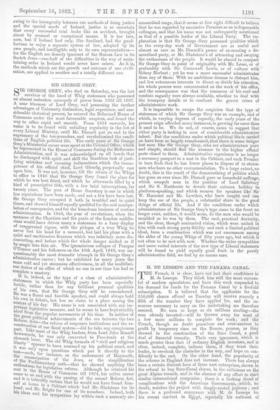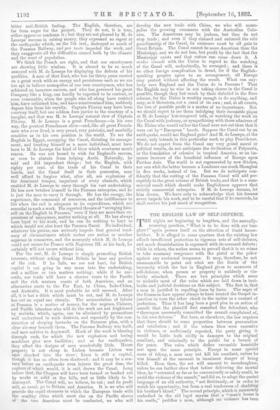M.DE LESSEPS AND THE PANAMA CANAL.
THE French, it is clear, have not lost their confidence in M. de Lesseps. They think him still the most success- ful of modern speculators, and have this week responded to his demand for funds for the Panama Canal by a fivefold subscription. It is believed that the applicants for the 250,000 shares offered on Tuesday will receive scarcely a fifth of the number they have applied for, and the re- sources necessary to carry on the undertaking are therefore
assured. No sum so large as six millions sterling—the sum already invested—will be thrown away for want of a few more millions to complete the work ; and the French, though no doubt penurious and over-anxious to profit by temporary rises on the Bourse, possess, as they showed in the construction of the Suez Canal, a good deal of financial tenacity. Their very ignorance, which is much greater than that of ordinary English investors, and is often, indeed, complete, induces them, if they trust their leader, to overlook the obstacles in the way, and hope on con- fidently to the end. On the other hand, the popularity of the scheme in England does not increase. There has always been a certain distrust here of these vast enterprises, shown in the refusal to buy Suez-Canal shares, in the criticisms on the great Alpine tunnels, and in the absence of any effort to start similar international companies ; there is a lurking dread of complications with the American Government, which, no doubt, watches the project with deeply-rooted jealousy ; and there is a profound annoyance with M. de Lesseps for his recent conduct in Egypt, especially his outburst of bitter anti-British feeling. The English, therefore, are far from eager for the project. They do not, it is true, either oppose or condemn it ; but they are not pleased by M. de Lessepa' success in raising money, they expressed no regret at the earthquake which, on the 7th inst., destroyed so much of the Panama Railway, and pro tanto impeded the work, and they exaggerate all the difficulties caused both by the climate and the want of population.
We think the French are right, and that our countrymen are showing little wisdom. It is absurd to be so much annoyed with M. de Lessepa for displaying the defects of his qualities. A man of that kind, who has for thirty years carried on a great work with an energy and persistence such as we are too apt to believe monopolies of our own countrymen, who has achieved an immense success, and who has governed his great Company like a king, can hardly be expected to be content, or even reasonable, when the people who all along have resisted him, have criticised him, and have countermined him, suddenly depose him from his royalty. Captain Fitzroy may have been courtesy itself, but one seldom does justice to the courtesy of a burglar, and that was M. de Lesseps' natural view of Captain Fitzroy. M. de Lesseps is a great Frenchman—in his own way, the greatest Frenchman alive—and, like all great French- men who ever lived, is very proud, very patriotic, and morbidly sensitive as to his own position in the world. To see the English in Egypt, occupying the Canal, dictating its manage- ment, and treating himself as a mere individual, must have been to M, de Lesseps the kind of blow which overturns men's reason. He was not bound to wish for England's success, or even to abstain from helping Arabi. Naturally, he said and did imprudent things ; but the English, with eighty per cent. of the trade of his Canal in their hands, and the Canal itself in their possession, may well afford to forgive what, after all, are explosions of the dominant temper, impatient of every obstacle, which enabled M. de Lesseps to carry through his vast undertaking. He has now betaken himself to the Panama enterprise, and he is just the man to carry it through. He has the energy, the experience, the command of resources, and the indifference to life when the end is adequate to its expenditure, which are essential to such a work. His reported threats of "avenging him- self on the English in Panama," even if they are more than ex- pressions of annoyance, matter nothing at all. Ho has always been loyal to' his work, and he can do nothing to hurt us which would not also hurt the Panama Canal. No individual, whatever his genius, can seriously impede that general tend- ency of circumstances which makes one nation or another supreme in commerce, and the monopoly which M. de Lesseps could not secure for France with Napoleon III. at his back, he certainly will not secure without him.
For the rest, M, de Lesseps is simply promoting British interests, without asking Great Britain to bear any portion of the risk. If he fails, we are not hurt, for British capital is not going in any mass into the undertaking, and a million or two matters nothing ; while if he suc- ceeds, our trade will have a shorter route to the Pacific and the rich western coasts of both Americas, and an alternative route to the Far East, to China, Indo-China, and Australia. It is most probable he will succeed. After all, it is but a ditch which must be cut, and M. de Lesseps has cut an equal one already. The accumulation of labour at Panama is a matter of money, for the negroes, Chinese, and Pacific islanders who will do the work are not frightened by malaria, which, again, can be alleviated by precautions well understood, in such districts, and especially by the con- struction of sleeping barracks on the Burmese plan, with a clear air-way beneath them. The Panama Railway was built, and men survive in Aspinwall. Much of the work is blasting through rook, for which the new explosives and boring machines give new facilities ; and as for earthquakes, they affect the designs of men wonderfully little. House property is not cheap in Lisbon because Lisbon was once chucked into the river ; Lima is still a capital, though it has so often been shattered ; and it may be a cen- tury before an earthquake even injures the great dam, the rupture of which would, it is said, drown the Canal. Long before that, the Chagres will have been turned or banked out by works as solid as the hills, and as little likely to be destroyed. The Canal will, we believe, be cut ; and its profit will, as usual, go to Britain and America. It is we who will provide the rapid steamers in which the European trade with the wealthy cities which must rise on the Pacific shores of the two Americas must be conducted, we who will
develop the new trade with China, we who will mono- polise the growing commerce with the Australian Colo- nies. The Americans may be jealous, but they do not stop trade ; and even if they claimed and enforced the sole guardianship of the Canal, its existence must be all gain to Great Britain. The Canal cannot be more American than the Mississippi, and we do not lose, but profit by the fact that the Mississippi exists and that cotton can come down it. A modus vivendi with the Union in regard to the watching of the Canal will, undoubtedly, be arranged ; and there is no other foreign complication to dread, for if the English- speaking peoples agree to an arrangement, all Europe may protest without affecting the result. What can any- body save England and the Union do in Panama ? That the English may be wise in not taking shares in the Canal is possible, though they lost much by their disbelief in the Suez scheme, for the Union is wealthy enough to do anything, and may, as it threatens, cut a canal of its own ; and, at all events, the loss of possible profit is a matter of no importance. But we should regret to see them indulging their excusable pique at M, de Lesseps' hot-tempered talk, or watching the work on the Canal with jealousy, or sympathising with those admirers of Mr. Blaine who would rather the Canal were not cut than that it were cut by " European " hands. Suppose the Canal out by an earthquake, would not England gain? And M. de Lesseps, at the worst, only intends in this particular work to play Providence. We do not expect from the Canal any very grand moral or political results, do not anticipate the civilisation of Polynesia, or the foundation of colonies in tropical America, or an im- mense increase of the beneficial influence of Europe upon Farther Asia. The world is not regenerated by new ditches, nor one whit the better because a Londoner can reach Shanghai in five weeks, instead of ten. But we do anticipate con- fidently that the cutting of the Panama Canal will add per- ceptibly to the great volume of British trade, and that is a com- mercial result which should make Englishmen approve that strictly commercial enterprise. If M. de Lesseps dreams, let him dream. We have only to acknowledge that his dreams never impede his work, and to be careful that if he succeeds, he shall receive his just !need of recognition.































 Previous page
Previous page